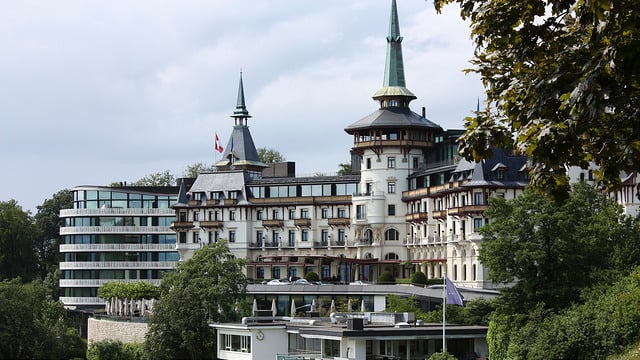CRIME
Banker gets 17 years in prison for murdering prostitute in Swiss luxury hotel
An investment banker who killed a Polish prostitute in Zurich’s Dolder Grand hotel in 2014 was on Thursday sentenced to 17 years in prison by a Swiss court.
Published: 28 July 2017 09:33 CEST

The Dolder Grand hotel. Photo: Wilhelm Rosenkranz/Flickr
The Zurich district court found the 49-year-old guilty of murder, and also demanded he pay his victim’s family 37,500 francs in damages, reported news agencies.
The body of the 25-year-old Polish woman, who worked as a dancer in a Zurich nightclub, was found by police in the man’s apartment in September 2014.
She had been reported missing by her family after failing to arrive in Poland on a planned visit the week before.
Records showed that the woman had spent the night with the banker in the Dolder Grand hotel on September 15th.
After tracing him to his apartment, police found the victim’s body in a suitcase stuffed into a wine fridge in his cellar.
The accused admitted the killing but denied any premeditation, claiming he killed her in the heat of the moment without intending to, reported news agencies during the court proceedings.
The pair had been in a relationship, he claimed, and she even wanted to move in with him. However, when he told her he had decided to stay with his existing partner, with whom he shared a home, she demanded he pay her off.
The accused said he then lost his cool and tried to shut her up, strangling her to death.
“I never intended to kill this woman. I just wanted her to be quiet,” he told the court.
However the prosecutor rejected his version of events, saying the man spent thousands of francs per month on prostitutes and saw himself as their saviour. He had been paying the victim for sex for several months and wanted to have a relationship with her. But fearing rejection, he killed her.
Text messages between the victim and her sister showed that the deceased had had no intention of leaving prostitution or moving in with the banker, said the prosecutor. She was also about to leave for a trip to Poland when the accused invited her to the hotel.
The man had brought a large suitcase to the hotel with a specific intention, said the prosecutor. He had also drugged the woman with Valium.
After the crime he took the body in the suitcase to his apartment, where he put it in the wine fridge and added air fresheners.
The convicted murderer has already spent the past three years in prison so he has a further 14 to serve.
Url copied to clipboard!


 Please whitelist us to continue reading.
Please whitelist us to continue reading.